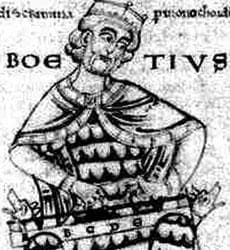
Blessed Severinus Boethius
Blessed
Feast Day: October 23
Biography
Blessed Severinus Boethius, also known as Anicius Manlius Torquatus Severinus Boethius, was a renowned figure of his time, often regarded as the last of the Romans. He was born between 475 and 480 in Rome, Italy, into a prestigious consular family. Tragically, he became an orphan at a young age when his father, who had been chosen as consul in 487, passed away.
However, Severinus was fortunate to find guidance and support from Quintus Aurelius Memmius Symmachus, a devout and influential aristocrat who was a close family friend. Under Symmachus' mentorship, Severinus received an exceptional education and displayed exceptional intellectual abilities. He excelled in his studies and became fluent in Greek, likely having studied in Athens, Greece, or Alexandria, Egypt.
Severinus married Rusticana, the daughter of Symmachus, and together they had two sons. His talents and achievements were recognized by the Roman Empire, as Severinus himself served as Roman consul in 510. Furthermore, his sons were chosen as Roman co-consuls in 522, a testament to the family's prominence and reputation.
Building on his reputation and intellect, Severinus became an aid and confidant to King Theodoric, the ruler of the Ostrogothic Kingdom. However, Severinus' affiliation with the king did not protect him from the challenges and dangers of the political climate. Accused by his rivals of disloyalty, plotting to restore the Republic, and engaging in sacrilege through astrology, Severinus was imprisoned without trial.
During his time in jail, Severinus contemplated the fragility and instability of a state that relied on the authority of a single individual, such as a king. These thoughts and reflections eventually found expression in his most famous work, "De Consolatione Philosophiae" or "The Consolations of Philosophy." In this seminal work, Severinus sought solace and wisdom through philosophical discourse, exploring the meaning of life, happiness, and the nature of evil and fortune.
Tragically, Severinus met a martyr's fate, as he was executed on the orders of King Theodoric. Soon after his untimely demise, a tradition emerged suggesting that his imprisonment and execution were, in fact, motivated by his unwavering adherence to orthodox Catholicism. Consequently, Severinus Boethius was revered as a martyr, with his story capturing the imagination of many faithful followers.
Throughout the centuries, Severinus Boethius has been venerated, and his holiness recognized. His relics are enshrined in the cathedral in Pavia, Italy, serving as a tangible reminder of his enduring spiritual legacy. Blessed Severinus Boethius was beatified in 1883 by Pope Leo XIII, confirming the cultus surrounding him and acknowledging his elevated status in the Catholic Church. His feast day is celebrated on October 23 (formerly September 23), inviting devotees to honor his memory and seek inspiration from his life of faith, intellect, and courage.